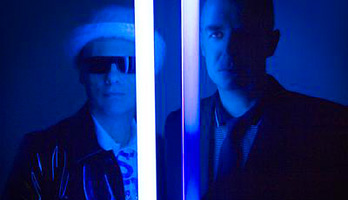Saturday, November 11, 2006
Wednesday, September 13, 2006
A long and progressive road...

A fascinating article by Philip Sherburne over at Pitchfork on track times and their possible heraldic properties. Mr. Sherburne’s column “The Month In Techno” is truthfully the only thing I regularly read at Pitchfork. He really seems to have his thumb on the pulses of scenes on both sides of the pond, not to mention that he’s a great writer. Ordinarily he's spot on with his reviews of records, performances and whole scenes, although I really think he’s missed the mark ever so slightly with this one.
As Mr. Sherburne pointed out about halfway through the piece, extended track times are nothing new in dance music. The original 12” version of disco classic “I Will Survive”, one of the (if not THE) most recognizable disco tracks of all time, lists a running time of
Mr. Sherburne proposes three possible reasons for such dramatic jumps in track times; firstly that due to the extended lengths of parties, tracks are being extended in a proportional manner; secondly that the relatively new digital media are allowing electronic artists the freedom to expand and fill said media with sound; and, finally that laptop sets are allowing DJs to test unfinished tracks, thereby introducing a degree of improvisation. Each of these reasons is equally plausible, and the reader can definitely see the logic underlying Mr. Sherburne’s conclusions. I find it interesting, and a little worrying, that only reasons indicating the growth of the minimal techno aesthetic have been presented. I would presume to suggest a forth, not-so-positive suggestion.
Has minimal techno, by all accounts a vibrant and exciting scene, been bitten by the progressive bug? I sincerely hope not. As I said earlier, Mr. Sherburne has immersed himself in the scene and he knows far more about it than I do, but where he sees manipulation of new media, I see the studio gimmickery and mellotron noodlings of Emerson, Lake & Palmer, Genesis, Pink Floyd and their ilk. Where he sees the infinite possibilities for improvisational sound manipulation, I see that scene in “This Is Spinal Tap” where the band takes the stage at a festival, minus guitarist Nigel Tufnel. “We’re not about to do a free-form jazz , uh, exploration in front of a festival crowd, are we?” asks bassist Derek Smalls. They did and hilarity ensued. Let’s hope that a half-hour minimal techno track doesn’t become it’s own joke.
Tuesday, July 04, 2006
Fundamentalist

My name is John and I am a Pet Shop Boys fan.
So you can imagine my excitement when the Pet Shop Boys' new album Fundamental practically leapt into my hands as I idly thumbed through the Pop/Rock rack at our local HMV. Once ensconced in the car on my hour-long commute home, I popped my shiny new CD into the stereo, prepared to bask in the glory that is 80's inflected electro-pop.
Boy was I surprised.
Fundamental opens with the dark and disturbing "Psychological", a haunting electro-house track with lyrics that are simultaneously nonsensical and evocative. "There's something in the attic/ And it smells so bad./ An Undertaker/ in a bowler hat./ (Psychological) / What's that spilt/ on the kitchen floor?/ Who's that banging/ on the cellar door?" sings frontman Neil Tennant as partner Chris Lowe's bassline grinds above ghostly groans . These lyrics, little more than disjointed phrases, suggest powerful and unsettling images and are the perfect precursor to the rest of the record.
Fundamental seems to be predominantly a response to the political climate both in the UK and Europe in much the same way Green Day's "American Idiot" was a response, although less subtle, to the political landscape of the good ol' US of A. The first single "I'm With Stupid" details British Prime Minister Tony Blair's fictitious doubts over Britain's alliance with the US in Iraq; "The Sodom & Gomorrah Show" describes a rural resident's first exposure to an Amsterdam or Ibiza-like world of sex, drugs, and dancing; the ballad "Luna Park" drips with bile over the Millennium Dome fiasco and an expected electoral backlash that never quite materialized. Stomper "Integral", a track reminiscent of the Boys' hit "Go West", anchors the record. A song about hard-line anti-terrorist surveillance policies put forth by
With Trevor Horn sitting in the producer’s chair again (he produced “Left To My Own Devices“ and “It’s Alright” from 1988’s Introspective) Fundamental is a lush record packed with all those little Horn-y flourishes. Sweeping strings flow in and out, over and under Art Of Noise bleeps and buzzes. It’s the kind of ear-candy that keeps a song fresh even when you know the words by heart and Horn is a master at it. “Left To My Own Devices” still sounds good, and I’m pretty sure Fundamental’s highlights will have equal staying power.
Having said all that, Fundamental is not a perfect record. The saccharine Release-reject "I Made My Excuses And Left" is glaringly out of sync thematically with the rest of the CD and its inclusion is a mystery to me. The Diane Warren ballad "Numb" is also a misstep, although given it's recent inclusion in the farewell-England world-cup montage it is destined to become a classic. These two tracks are the most typical of the Pet Shop Boys output and perhaps that's why I like them the least.
Happily, at least for me, Fundamental sounds like a Pet Shop Boys album without sounding too much like a Pet Shop Boys album. Put another way, Tennant, Lowe, and Horn have managed to craft a thoughtful and emotional record, while retaining their twin signatures of electro-pop and wry, tongue-in-cheek lyrics. It's a combination that has served them well in the past and continues to serve them on Fundamental. I mean, when an album has a song on it called “Minimal”, which describes all things minimal and sounds anything but minimal (Horn strings, hello!) it’s the kind of delicious irony that can only be the Pet Shop Boys. Who says pop never lasts, anyway?

